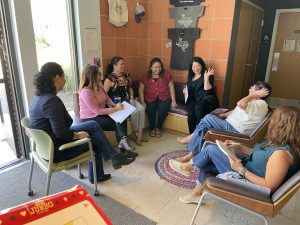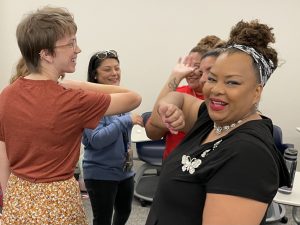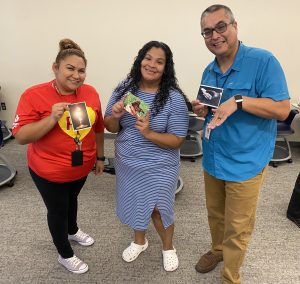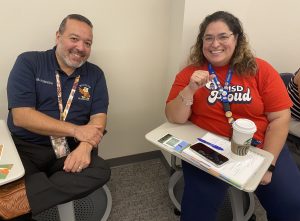Oct 17, 2024 Name Pronunciation Resources: A Story from the Field
 One of my most rewarding professional facilitation experiences has been my ongoing work with the Austin Independent School District in Texas. For more than ten years, I’ve had the honor of facilitating professional learning, visioning, and community building with AISD’s social and emotional learning department, mental health counselors, social workers, and multi-tiered systems of support teams. Recently, I led two professional learning days focused on the art of group facilitation with AISD’S Families as Partners parent support and engagement team.
One of my most rewarding professional facilitation experiences has been my ongoing work with the Austin Independent School District in Texas. For more than ten years, I’ve had the honor of facilitating professional learning, visioning, and community building with AISD’s social and emotional learning department, mental health counselors, social workers, and multi-tiered systems of support teams. Recently, I led two professional learning days focused on the art of group facilitation with AISD’S Families as Partners parent support and engagement team.
The highlight of the workshop was engaging with the Name Meanings activity. Most participants were bilingual native Spanish speakers, and the activity became an opportunity to celebrate participants’ diverse culture and heritage. In a safe space, people shared stories of name and family, as well as stories about the challenges and frustrations of regularly having their names mispronounced, shortened without their consent, or anglicized.
 Many participants shared that despite growing up and working in the US as native Spanish speakers and habitually reverting to anglicized versions of their names, in recent years they’ve been feeling more confident about emphasizing the correct pronunciation of their names. They’ve done this with professional colleagues and peers as well as within the community. Many shared that it was the Name Meanings activity that helped solidify this step for them.
Many participants shared that despite growing up and working in the US as native Spanish speakers and habitually reverting to anglicized versions of their names, in recent years they’ve been feeling more confident about emphasizing the correct pronunciation of their names. They’ve done this with professional colleagues and peers as well as within the community. Many shared that it was the Name Meanings activity that helped solidify this step for them.
Name Meanings helps create a foundation for respect and honor because it gives everyone an opportunity to voice their preference and their story. The activity serves as an invitation and opportunity for their peers to clarify and practice pronunciation in a supportive space.
 I see this often in my workshops— co-workers feel like they can finally ask their peers to pronounce their name a few times and practice back and forth, without it feeling awkward or rude. Many people share that they hadn’t asked about pronunciation because they thought they should know already. Then, uncertain and embarrassed, they’d avoided the name entirely.
I see this often in my workshops— co-workers feel like they can finally ask their peers to pronounce their name a few times and practice back and forth, without it feeling awkward or rude. Many people share that they hadn’t asked about pronunciation because they thought they should know already. Then, uncertain and embarrassed, they’d avoided the name entirely.
The Families as Partners facilitators discussed how significant this activity was to their work as family support specialists. Names can be incredibly important to families because a great deal of care, meaning, and culture are woven into them. Trust is built when educators honor students’ and families’ names by taking the time to use them correctly.
 Last week, I sent the Parent Support Specialists group their “Postcards to their Future Self.” One of the participants, Frutoso, reached out to tell me his postcard had arrived on just the right day. (I get this magical feedback a lot about the postcards).
Last week, I sent the Parent Support Specialists group their “Postcards to their Future Self.” One of the participants, Frutoso, reached out to tell me his postcard had arrived on just the right day. (I get this magical feedback a lot about the postcards).
I noticed that embedded in Frutoso’s email signature was a NameDrop pronunciation of his name. NameDrop’s company mission states: “We believe that no one should have to hear a broken version of their name. So, we made it easy for you to share your name with the world in your voice. Simply record your name as it’s meant to be said, and get your personal name link.”
I reached out to Frutoso to ask about his experience with NameDrop. Here is his response:
I noticed NameDrop on someone else’s signature with a unique name from another country. I needed to call her, but I wanted to honor and respect her name and properly pronounce it before calling her.
My experience is that my name story has been an icebreaker for people asking me about my name and its history. Most have never heard of it or aren’t sure how to pronounce it—first or last name.
If I’m being completely honest, my name is misspelled. When my grandfather was born in Brownsville, TX, the nurse wrote his name on the birth certificate as she heard it. My father is a junior, and I’m Frutoso III.
When I asked my grandfather why his parents named him “that name,” he said it was common to name your child the “Saint” of the day. In his case, January 21 is San Fructuosus Day.
Of course, as a child, I didn’t believe him, only because I had never heard such a thing. I was familiar with some saints but thought, “Yeah, right, Saint Frutoso, whatever Grandpa.”
Saint Fructuosus of Tarragona was a Christian saint, bishop, and martyr. He is an important name in the early history of Christianity in Hispania. He was bishop of Tarragona and was arrested during the persecutions of Christians under the Roman Emperor Valerian.
I had a teacher here in Houston from Spain meet me in my office and notice my nameplate on my desk. He shared that Fructuoso was a common and popular name in his country, a lot of the older generation could be found with that name, which is also used for women, Fructuosa, much like Maria and Mario in other Spanish cultures. As an adult, I appreciate the uniqueness of my name and am honored to be named after my grandfather and Saint Fructuosus.
Frutoso’s is one of many beautiful stories you might learn if you engage in the Name Meanings activity.
More Resources:
Name drop: NameDrop – a name pronunciation service Namedrop.io
Namecoach: name pronunciations embedded online
Names That Are Unfamiliar to You Aren’t “Hard,” They’re “Unpracticed” | Teen Vogue
Say My Name | Why Pronouncing Names Correctly is Important | Idealist



No Comments